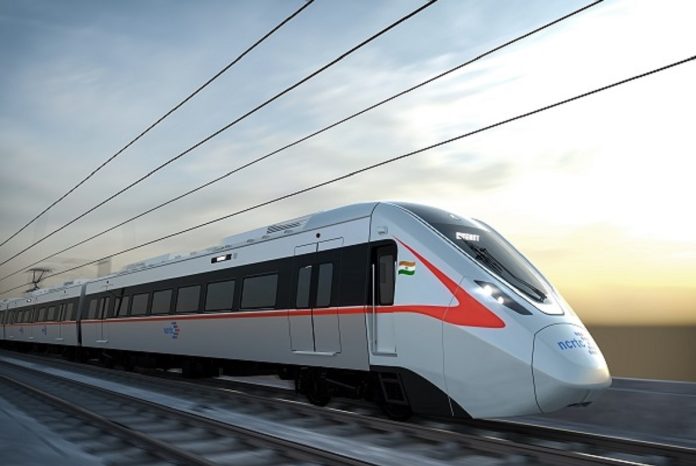Snapshot
On delivery of the semi-high-speed aerodynamic trainsets at Duhai depot, the 17 km priority section on the Delhi-Ghaziabad-Meerut corridor will be commissioned after the mandatory trial run.
The first trainset of India’s Regional Rapid Transit System (RRTS) corridor is on its way by road to Duhai in Uttar Pradesh after being loaded on a trailer at the manufacturing factory of Alstom at Savli in Gujarat.
With the delivery of the semi-high-speed aerodynamic trainsets at Duhai depot, commissioning of the 17 km priority section on the Delhi-Ghaziabad-Meerut corridor is slated to happen after the mandatory trial run.
National Capital Region Transport Corporation (NCRTC) is planning to commence trial runs on the priority section of the Delhi-Ghaziabad-Meerut RRTS corridor by the end of this year.
“We’re inching closer towards completing our project day by day. NCRTC team has worked persistently even during the pandemic to keep the project on schedule. The handover of the first trainset is an important milestone as we move towards the commissioning of the 17 km priority section,” said NCRTC Managing Director Vinay Kumar Singh.
The first trainset of RRTS was handed over to NCRTC earlier this month on 7 May 2022 at an event organised at the manufacturing site in the presence of senior officials of Housing and Urban Affairs and NCRTC.
Singh said, “These state-of-the-art trainsets with modern commuter-centric amenities are yet another example of what we can achieve within the country with a strategic approach, hard work and dedication.”
It would take about a week to reach Duhai Depot at Ghaziabad, which is gearing up for the trainset arrival. The tracks have been laid out, shades prepared for the workshop and preparations are being made for the testing of the train at the depot. For the operation of the RRTS trains, an administrative building has also been constructed in the depot.
For the testing and the maintenance of the RRTS trains, 11 stabling lines, two workshop lines, three internal-bay lines (IBL) and one heavy internal cleaning (HEC) line are being constructed. The construction of one workshop and one IBL line is in the final stage, while the construction of the rest of the lines has been completed.
Alstom has been awarded the contract of manufacturing the RRTS trains under Make In India, as per which they would be delivering 40 trainsets, including 10 three-car trainsets for Meerut Metro, bundled with rolling stock maintenance for 15 years.
The contract also includes designing, supplying, installing, testing, and commissioning signalling and train control, supervision, platform screen doors, and telecommunication systems for the entire Delhi-Ghaziabad-Meerut corridor.
The trainsets, with their sleek and modern design, will be lightweight equipped with a regenerative braking system and compatible with automatic train protection (ATP), automatic train control (ATC), and automatic train operations (ATO).
The regenerative braking system is an important feature of these trains, which generates electricity when the brakes are applied and the power goes back to the electric grid through the overhead traction of the train system.
The RRTS trains have ergonomically designed 2×2 transverse seating, wide standing space, luggage racks, CCTV cameras, laptop/mobile charging facility, dynamic route maps, auto control ambient lighting system, heating ventilation and air-conditioning system (HVAC) and other amenities.
The air-conditioned RRTS trains will have standard as well as premium class (one coach per train) along with one coach reserved for women commuters.
RRTS is the first-of-its-kind system in which trains, with a design speed of 180 kmph, will be available every 5-10 minutes and cover the distance between Delhi and Meerut in 55 minutes.
RRTS trainsets will have one premium class on every train to give a new level of comfort, convenience, and user-friendliness with wider seats with more legroom, and coat hangers.
NCRTC has taken the initiative of building a huge network by seamlessly connecting the various public transit systems in NCR. With multi-modal-integration, RRTS stations will have seamless integration with metro stations, railway stations, and bus depots, wherever possible.
Once operational, the first RRTS corridor is estimated to reduce 250,000 tonnes of carbon dioxide in vehicular emissions per year. With an expected daily ridership of around 8 lakh passengers, RRTS will be the most energy-efficient futuristic transit system.


